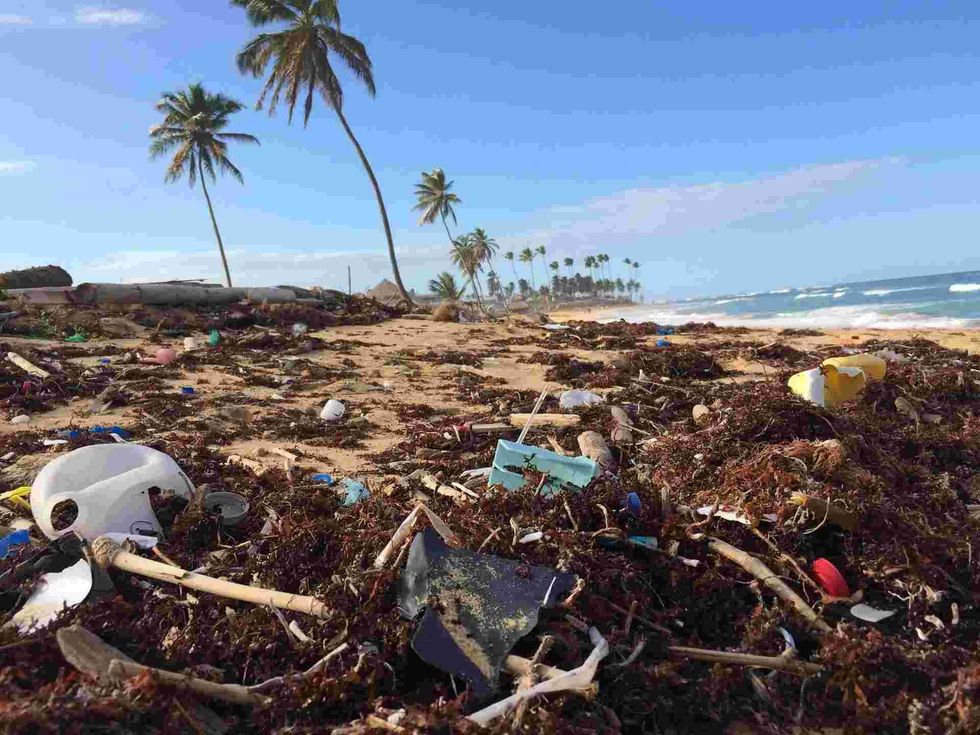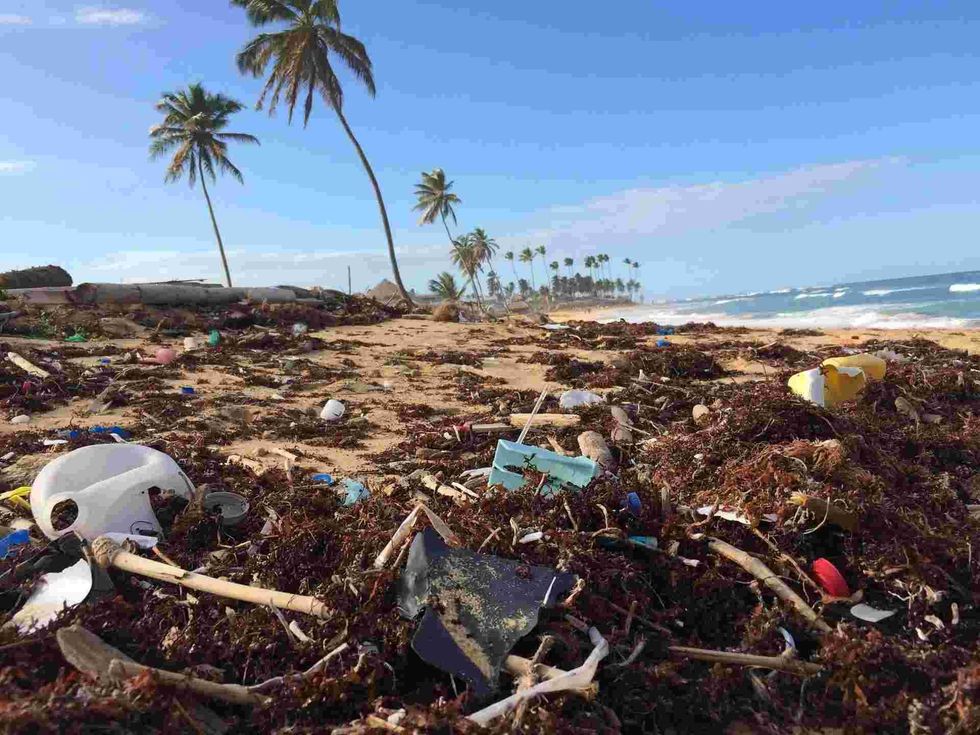35 Facts About Land Pollution: Know How Solid Waste Cause Polluted Soil

Land pollution is the deposition of any element on the earth's surface that degrades the composition of the surface.
The field of land pollution is diverse. It has given rise to branches of other types of pollution.
Almost all types of pollution, starting from air to water pollution, including thermal and nuclear pollution, can be caused by land pollution. Pollution on earth started with the beginning of mankind.
Scientists revealed that the bubbles trapped in the ice of Greenland suggest that greenhouse gasses were emitted from at least 2,000 years ago. Today, climate change stands as the biggest problem of pollution that the world is facing and it concerns every corner of the earth.
We are highly threatened by global warming currently because of climate change, which will eventually destroy the earth leaving behind no trace of human civilization.
Activities such as basic as farming also result in pollution in today's world. Farmers using chemicals such as pesticides and herbicides leave behind a trail of toxins on the soil which results in land pollution.
In this way, almost every sector is responsible for causing land pollution of some magnitude at present. To stop further degradation of the earth's resources we have to follow certain measures that will reduce the effects of pollution.
If you are looking for more such content, then keep on reading the articles on facts about noise pollution and factory pollution facts too.
Land Pollution Meaning With Example
When we talk about the environment and its conservation measure, the term that frequently comes up is pollution. Environmental pollution can be of many types and one of them is land pollution.
Land pollution causes the degradation of the earth's land surface from its natural form due to human activities. Deforestation is one of the main causes of land pollution, often brought about by the expansion of cities leaving behind fewer areas for trees.
Sinkholes or cave-ins formed due to mining works are common sources of land pollution.
A large number of waste materials cause land pollution, the harmful chemicals emitted from the landfills pollute the soil. The most common examples of the effects of land pollution are soil erosion and change in the climate of a place.
Land pollution has many serious effects on the environment. One of the biggest issues is that toxic pollution affects the fertility of soil largely.
Soils losing their fertility take a massive toll on a region's agriculture. Lack of soil fertility does not only indicate reduced growth of crop plants but also limits the grazing capacity of the livestock.
Improper disposal of waste materials is the number one reason for soil pollution. Loss of ecosystem, soil erosion, and pollution have resulted in habitat loss for many wildlife species. The lack of tree cover causes the change of the natural environment which further contributes to climate change.
The toxic materials of the polluted lands might contaminate groundwater and the produce we consume. When we consume such contaminated substances, we might fall sick.
Millions of tons of solid waste produced are not wholly recycled. Whatever non-recyclable solid waste accumulates, it is dumped in landfills. Landfills have devastating effects on the land surface and also look very unattractive.
Non-biodegradable waste has ill effects of a greater magnitude than recycled materials. For example, plastic is a non-biodegradable hazardous waste product that releases chemicals that pollute both land and air.
Recycling and reusing reduce land pollution and decreases the waste materials of the landfill, especially the non-biodegradable products such as plastic waste. This will reduce the chances of soil erosion due to contaminated soil. Waste management methods teach various ways to reduce waste production and how to treat them so the adverse effects reduce.
Land Pollution Sources
The earth's surface is living in a nightmare. The effects might not be visible clearly yet, but our land is facing high environmental risks.
This type of pollution has become one of the most serious concerns and we are unable to calculate the actual damage that land degradation has incurred. Any drastic change that degrades the productivity of an ideal place for agriculture, construction, and forestation can be considered to be a source of land pollution.
Neglecting the effects of land pollution from the beginning has given rise to many complications at present which are hard to overcome.
The increasing number of barren plots and decreasing rate of tropical forest cover is alarming. Moreover, modernization and development can also be considered to be significant sources of land pollution.
Currently, deforestation carried out for clearing the lands is a major threat. A land that once turns barren can never regain its fertility again.
This decreases the productivity of the land. When such measures are carried out on land, it results in processes that alter or modify the actual property of the land. It is one of the major land pollution causes and it hampers the land's quality immensely.
The problem of continuous wastage of land also diminishes the resources of the earth. A cleared piece of land that remains unused for years turns barren after a while.
Bare land is exposed more to the natural process of wind erosion which may cause land pollution. So the search for land should be done more efficiently.
Agricultural activities also give rise to waste products that degrade the quality of the land. With the increasing world population, the demand for food has increased considerably. Often strong toxic chemical fertilizers are used by farmers to get rid of bacteria and fungus from the crops.
Overuse of such chemical fertilizers contaminates the soil and results in hazardous waste. Eating such crops with heavy use of fertilizers has adverse effects on human health.
Industrial waste, urbanization, and construction activities result in the production of a significant portion of municipal solid waste that pollutes the land. The increasing demand for food and shelter generates a larger amount of industrial waste than before.
Increasing waste materials suggests that they need to be disposed of properly. The number of permanent human settlements has increased since the past 100,000 years as the world's population increased.
Some people consider might consider this form of human settlement as land pollution since urbanization changes the landscape significantly. This may generate municipal solid waste or and cause land pollution.
The municipal solid waste of a construction site that causes land pollution includes huge debris of waste particles like bricks, wood, plastic, and concrete. Landfills are also a major source of land pollution.
Every household produces tonnes of household garbage each year. The waste that cannot be recycled become a part of the unattractive landfills that destroy the beauty of land causing land and air pollution both.
Nuclear waste is an important and dangerous source of land pollution. The harmful and toxic residue of radioactive materials should be disposed of carefully. To avoid casualties and health risks, such hazardous waste should be dumped beneath the earth.
Sewage spills and sewage treatment generates both solid and liquid waste materials that accumulate in the landfill. They end up polluting the land.
Human activities such as littering are another big source of land pollution. People throwing garbage on the streets and roads have adverse effects on land, it also hampers the beauty of the places where they live. Littering is partially controlled in developed countries by imposing strict rules but for developing nations, it poses a significant threat.

Effect Of Land Pollution On Humans And Environment
Land pollution has some serious consequences on the flora and fauna of the earth. The consequences can be way more devastating if people do not immediately resort to recycling and reusing waste products and separating organic waste from inorganic ones.
The modernization of human civilization has destroyed and degraded the quality of land and resulted in the generation of tonnes of waste globally. The effect of such consequences is the reduced capacity of the environment and its life forms. There are some devastating long-lasting effects of land pollution.
The effects on human health are multifaceted. Tonnes of garbage or waste accumulate in landfills every year.
Many countries, especially developing nations, do not have the technology to regulate all the waste generated. They rot openly in huge debris producing a foul smell.
Such waste may range from nominal household garbage like food waste and animal waste to hazardous waste products such as pesticides, chemical components such as cyanide, mercury, and arsenic. These types of land pollution can indirectly damage the very organs of a human being and even cause death.
Soil pollution is a category that is included under land pollution. This type of pollution has a large number of sources ranging from the overuse of fertilizers to dumping solid waste in landfills.
The continuous abuse of soil and accumulation of inorganic waste in the top layer of soil poses a threat to plants and animals, disrupting the food chain. Electronic waste or e-waste might also end contaminating the soil, which upsets the land's ecology and causes pollution.
Air pollution is indirectly caused. Dumping garbage in a landfill or debris year after year produces a foul odor in the area.
Citizens living beside such dumping grounds in cities and towns experience such pungent smells all the time. Apart from the smell, something or the other is always burning in the landfill. Such fires are caused by natural ignition due to the immense heat generated from the decaying compost and the smoke causes air pollution.
Finally, air pollution can also take the form of greenhouse gases such as sulfur dioxide and carbon dioxide. The toxic gases take part in further chemical reactions of the ecosystem producing acid rain.
Water pollution is also caused. Land pollution has diverse effects, it can spread in all directions and can contaminate drinking water too.
When toxins and other substances flow into the waterways carried by rainwater, it reduces the water quality widely. Leaching also causes the chemicals and toxic substances to infiltrate a city's aquifers and water tables which makes the drinking water harmful for humans.
The polluted water evaporates and falls on earth as impure precipitation and this way, the contamination continues in a cycle.
The tourism industry is affected. A polluted city with wastage dumped all over the city attracts less tourists than a place where waste is more controlled.
Less tourism means lower revenue and the government incurs a loss in tourism revenue. Tourists avoid going to polluted places, mainly due to health concerns. Polluted cities give off a very bad picture of the residents and government, it will only depict an environmental insensitivity of the place and its citizens.
Prevention Of Land Pollution
The pollutants of land can be solid, liquid, or gaseous. No matter what their physical state is, all types of pollutants are responsible for degrading the quality of the land in some magnitude.
There are several sources of land pollution and the effects of it are devastating. However, to eliminate such pollution you have to prevent yourself from using toxic elements and replace them with non-hazardous materials.
Reducing the overuse of fertilizers and pesticides for crops may decrease the rate of land pollution. Using such chemicals is necessary for plants to prevent bacteria infestation but their use has to be optimized.
Otherwise, it will lead to severe problems of pollution whose effects will create health concerns in the future. Using some types of chemicals in wrong proportions for a long time can harm the environment when used for long.
Farmers should replace such fertilizers with bio-fertilizers and compost manure. Replacing pesticides with biological pest control may also minimize land pollution. Reforestation instead of deforestation has good effects on land.
Forest trees and grassland vegetation protects the land from direct exposure to the agents of pollution. They also support a large number of wildlife habitats that are snatched away by land pollution.
Land pollution causes the land to lose its fertility. Restoring forests and planting trees is the only way the land can be made fertile again.
The chemical and biological properties of waste can also be altered so that they produce less pollution. Chemical treatment of solid waste and e-waste can alter the pH level of wastes, this will make the substances less toxic than before when dumped in a landfill.
Adding chemicals or enzymes to insoluble waste helps in degrading its level of toxicity. Adding particular chemicals or enzymes might help in doing so before it is dumped in landfills.
Finally, the most important prevention method of any type of pollution is the three Rs- reduce, reuse, and recycle. It is the main principle of reducing any type of waste produced in the world by reducing the use of toxic elements and reusing or recycling the wasted products time and again.
It is perhaps the most effective measure to control land pollution.
Here at Kidadl, we have carefully created lots of interesting family-friendly facts for everyone to enjoy!
If you liked our suggestions for 35 facts about land pollution: know how solid waste cause polluted soil, then why not take a look at 13 colonies facts: here's what you need to know about American colonies, or know all about the largest freshwater lakes in the world?
We Want Your Photos!
More for You
Doctorate specializing in Veterinary Medicine

Oluniyi AkandeDoctorate specializing in Veterinary Medicine
With an accomplished background as a Veterinarian, SEO content writer, and public speaker, Oluniyi brings a wealth of skills and experience to his work. Holding a Doctor of Veterinary Medicine degree from the University of Ibadan, he provides exceptional consulting services to pet owners, animal farms, and agricultural establishments. Oluniyi's impressive writing career spans over five years, during which he has produced over 5000 high-quality short- and long-form pieces of content. His versatility shines through as he tackles a diverse array of topics, including pets, real estate, sports, games, technology, landscaping, healthcare, cosmetics, personal loans, debt management, construction, and agriculture.
Disclaimer
1) Kidadl is independent and to make our service free to you the reader we are supported by advertising. We hope you love our recommendations for products and services! What we suggest is selected independently by the Kidadl team. If you purchase using the Buy Now button we may earn a small commission. This does not influence our choices. Prices are correct and items are available at the time the article was published but we cannot guarantee that on the time of reading. Please note that Kidadl is a participant in the Amazon Services LLC Associates Program, an affiliate advertising program designed to provide a means for sites to earn advertising fees by advertising and linking to Amazon. We also link to other websites, but are not responsible for their content.
2) At Kidadl, we strive to recommend the very best activities and events. We will always aim to give you accurate information at the date of publication - however, information does change, so it’s important you do your own research, double-check and make the decision that is right for your family. We recognise that not all activities and ideas are appropriate for all children and families or in all circumstances. Our recommended activities are based on age but these are a guide. We recommend that these ideas are used as inspiration, that ideas are undertaken with appropriate adult supervision, and that each adult uses their own discretion and knowledge of their children to consider the safety and suitability. Kidadl cannot accept liability for the execution of these ideas, and parental supervision is advised at all times, as safety is paramount. Anyone using the information provided by Kidadl does so at their own risk and we can not accept liability if things go wrong.
3) Because we are an educational resource, we have quotes and facts about a range of historical and modern figures. We do not endorse the actions of or rhetoric of all the people included in these collections, but we think they are important for growing minds to learn about under the guidance of parents or guardians.







